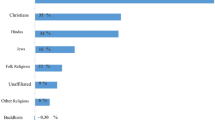Abstract
Despite ongoing debates about the nature and role of multiculturalism in the UK, the idea of integration remains significant in British immigration policies and community relations, and it orients itself towards second and third-generation diasporans as well as recent arrivals. Drawing on original data from the UK Iranian diaspora, this paper aims to complicate extant debates by exploring the cultural dimensions of integration mainly at the intra-diasporic level. Particularly among secular middle-class UK Iranians, ‘integration’ acts as an idiom for being a ‘good’, ‘successful’, ‘proper’ Iranian, and a failure to integrate is often described as unacceptable and even shameful. Integration in this sense mirrors dominant neo-liberal attitudes and puts huge pressure on Iranians to constantly ‘do better’ in cultural and economic terms to justify their presence in the UK. Crucially, these processes are predicated on a critique and/or rejection of Iranian Shiism and Islam in general, thus helping to marginalize Iranian Shia identities in representations of Iranian-ness in the British mainstream. We argue, therefore, that dominant policies and discourses of integration, regardless of their stated intention, intersect with the multiple and competing realities that exist in a diasporic community to produce particular social and cultural relations which may exclude identities protected under UK law. However, we also draw comparison with the US to suggest that these dynamics might begin to change in the near future.
Similar content being viewed by others
Notes
See for example: https://www.independent.co.uk/voices/parsons-green-radicalisation-british-muslims-austerity-middle-east-a7957766.html (accessed 30/07/2018)
Due to space limitations, the article will not focus on the particularities of devout Iranian Shia identities and practices.
Although its political composition and aims were very complex, the Green Movement of 2009 can be seen as an example of this.
It should be noted that there are also Iranian Jews, Christians and Bahais, though research on them is scarce.
A meet-up located at http://bit.ly/2y6qFUX (accessed 10/10/2017)
The project was led by Professor Sreberny.
For a more detailed discussion, see Sreberny and Gholami 2016.
For example, the ‘improvement’ requirement known as the A2 test took effect in 2017.
This report was commissioned by the UK government in response to so-called ‘race riots’ in some northern English towns, which Cantle blamed on the ‘self-segregation’ of ethnic minority communities. The report had a significant impact on UK policy and helped to usher in the ‘community cohesion’ agenda which saw sweeping changes in the UK’s naturalization and citizenship processes.
For a more in-depth analysis of Iranian supplementary schools, see Gholami 2017.
BICDO’s mission statement can be found on its website (http://www.bicdo.org/ or https://www.facebook.com/BicdoYouth/ Accessed 18/11/2017). As part of our project we also interviewed several senior staff, including the Director, who expressed these aims.
An annual fire festival anticipating Nowruz, the Iranian New Year.
See for example: https://www.independent.co.uk/voices/the-shiites-are-winning-in-the-middle-east-and-its-all-thanks-to-russia-a7197081.html (accessed 30/07/2018)
https://www.bbc.co.uk/news/world-middle-east-16047709 (accessed 30/07/2018)
See for example: https://redice.tv/red-ice-radio/the-iranian-renaissance-and-aryan-imperium (accessed 20/12/17)
Quoted from: http://www.chronicle.com/blogs/letters/notions-of-aryan-iranianness-must-be-rejected/ (accessed 21/12/17)
References
Al-Ahmad, J. (1984). Occidentosis (gharbzadegi). London: Mizan Press.
Alinejad, D. (2017). The internet and formations of Iranian American-ness: Next generation diaspora. London: Palgrave Macmillan.
APPG (2017) Integration not demonisation. Available online at: http://d3n8a8pro7vhmx.cloudfront.net/themes/570513f1b504f500db000001/attachments/original/1503672973/TC0016_AAPG_Integration_not_Demonisation_Report_1-Page_view.pdf?1503672973 (accessed 24/04/2018).
Gholami, R. (2015). Secularism and identity: Non-Islamiosity in the Iranian diaspora. London and New York: Routledge.
Gholami, R. (2017). Beyond myths of ‘Muslim education’: A case study of two Iranian schools in London. Oxford Review of Education, 38(6), 798–811. https://doi.org/10.1080/03054985.2017.1352352.
Jarvis, L., Atakav, E. and Marsden, L. (2017) What British Muslims think about the term ‘British values’ The Conversation, available online at: http://theconversation.com/what-british-muslims-think-about-the-term-british-values-86423 (accessed 30/07/2018).
Keddie, N. (2003). Modern Iran: Roots and results of revolution. New Haven and London: Yale University Press.
Kundnani, A. (2007). Integrationism: The politics of anti-Muslim racism. Race and Class, 48(4), 24–44.
Lessard-Phillips L. and Galandini S. (2015) Immigrant integration in British society. Economic and Social Research Council – Evidence briefing. Available online at: http://projects.socialsciences.manchester.ac.uk/unity-out-of-diversity/publications/ (22/07/2018).
Maghbouleh, N. (2017) The limits of whiteness: Iranian Americans and the everyday politics of race, Stanford University Press.
Meer, N., & Modood, T. (2014). Cosmopolitanism and integrationism: Is British multiculturalism a ‘zombie category’? Identities: Global Studies in Culture and Power, 21(6), 658–674.
Milani, M. (2018) The making of Iran’s Islamic revolution: From Monarchy to Islamic Republic. London and New York: Routledge.
Modood, T. (2012). Post-immigration ‘difference’ and integration: The case of Muslims in Western Europe. A report prepared for the British Academy.
Muslim Council of Britain (2015). Meeting between David Anderson QC and the MCB: Concerns on prevent. Retrieved from https://www.mcb.org.uk/wp-content/uploads/2015/10/20150803-Case-studiesabout-Prevent.pdf (27/02/2018).
Muslims in Britain (n.d.). Islam’s Place in the World and in Britain. Retrieved from http://guide.muslimsinbritain.org/guide3.html (accessed 10/10/2017).
Novelli, M. (2017). Education and countering violent extremism: Western logics from south to north?. Compare: A Journal of Comparative and International Education, issue and no? doi: https://doi.org/10.1080/03057925.2017.1341301.
Open Society (2016). Eroding trust: The UK’s prevent counter-extremism strategy in health and education. Retrieved from https://www.opensocietyfoundations.org/sites/default/files/erodingtrust-20161017_0.pdf (27/02/2018).
Paige, S., Hatfield, E. and Lian, L. (2015) How welcome do Iranian-Americans feel in their homeland? Perceptions of social distance among Muslim, Jewish, and Non-Religious Iranian-American adults. SpringerPlus 4: 747. Available online at: https://doi.org/10.1186/s40064-015-1531-4.
Spellman, K. (2004). Religion and nation: Iranian local and transnational networks in Britain. New York and Oxford: Berghahn Books.
Sreberny, A., and Gholami, R. (2016). Iranian communities in Britain. London: London Middle East Institute, SOAS, University of London. Retrieved from https://www.soas.ac.uk/lmei-cis/events/file113142.pdf (accessed 03/09/2018).
Sreberny, A., and Gholami, R. (in press). The politics of diasporic integration: The case of Iranians in Britain”, in R. Tzagarousianou and Rettis, J. (eds). Handbook on Diasporas, Media and Culture. London: Wiley Blackwell.
Tehranian, J. (2009). Whitewashed: America’s invisible middle eastern minority. New York and London: New York University press.
Wieviorka, M. (2014). A critique of integration. Identities: Global Studies in Culture and Power, 21(6), 633–641.
Author information
Authors and Affiliations
Corresponding author
Rights and permissions
About this article
Cite this article
Gholami, R., Sreberny, A. Integration, class and secularism: the marginalization of Shia identities in the UK Iranian diaspora. Cont Islam 13, 243–258 (2019). https://doi.org/10.1007/s11562-018-0429-7
Published:
Issue Date:
DOI: https://doi.org/10.1007/s11562-018-0429-7




